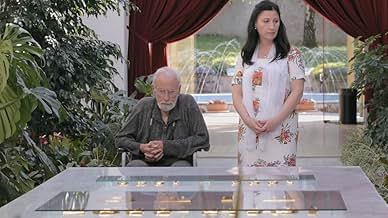Der Film untersucht den Mythos des geheimen Milliardengeschäfts hinter dem Kauf des geheimen jugoslawischen Raumfahrtprogramms durch die USA Anfang der 1960er-Jahre.Der Film untersucht den Mythos des geheimen Milliardengeschäfts hinter dem Kauf des geheimen jugoslawischen Raumfahrtprogramms durch die USA Anfang der 1960er-Jahre.Der Film untersucht den Mythos des geheimen Milliardengeschäfts hinter dem Kauf des geheimen jugoslawischen Raumfahrtprogramms durch die USA Anfang der 1960er-Jahre.
- Auszeichnungen
- 3 Gewinne & 5 Nominierungen insgesamt
- Self
- (Archivfilmmaterial)
- Self
- (Archivfilmmaterial)
- Self
- (Archivfilmmaterial)
- (as Lyndon Johnson)
- Self
- (Archivfilmmaterial)
- Self
- (Archivfilmmaterial)
- Self
- (Archivfilmmaterial)
- Self
- (Archivfilmmaterial)
Empfohlene Bewertungen
Zizek's usual overcooked but useless philosophical platitudes ring even more hollow than usual in this context – although he did have some funny lines in the beginning (yeah, and the socks, whatever).
It may be an interesting film for a disengaged and clueless audience, who were not affected by the history depicted in this film (or similar experiences in other parts of the world) – but imagine making such a clinical allegory of another, more "relevant" "country disintegration war" or even (gasp) genocide – take your pick – Israel, Palestine, Syria, Libya, etc. -- the filmmaker would maybe be more vilified/ostracized/banished than celebrated for his "cleverness." If you want an effective allegory of what happened with Yugoslavia, watch Tanovic's Oscar winner "No Man's Land," or even better, Kenovic & co.'s SaGA films (google it) – from that part of the world, Bosnians are much better and more interesting storytellers and record keepers than Slovenians (and much funnier, too – for full disclosure, I am not Bosnian and I don't subscribe to ethnic disparagement or similar).
PS. It's not really a "1" more like a "5" rating, but just to counter this ridiculous overrated extravaganza here.
"Houston, We Have a Problem!" blurs the boundaries between reality and fiction as it delves into the mythology surrounding the start of America's race to be the first nation to send a man to the moon and the purported multibillion-dollar agreement behind America's acquisition of Yugoslavia's space program in the early 1960s.
This documentary film is a fascinating meta-examination of Cold War foreign diplomacy and myth-building, as well as the lies, manipulation, and dirty games that go into the construction of a national identity. It deftly combines archival footage with contemporary interviews with philosopher Slavoj Zhizhek and some of the key figures in the film's investigation, including a former Yugoslav space engineer, an American historian, and a retired Yugoslav People's Army general.
Perhaps after watching that, you will see why Yugoslavia was destroyed by bombardment.
Interesting piece of art!
Stephen Dalton from The Hollywood Reporter described the film as "consistently witty and entertaining, even when testing the limits of audience gullibility... ultimately less a film about Cold War politics than a sly commentary on our current climate of internet myth-making and 'post-truth' public figures", and that philosopher Slavoj Zizek has a chorus role which warns that comforting fiction is often more appealing than complex fact, "even if it didn't happen, it's true. That's the crucial message.
At the end i think it is a good movie but actualy is not a Documentary.
Wusstest du schon
- WissenswertesOfficial submission of Slovenia the 'Best Foreign Language Film' category of the 89th Academy Awards in 2017.
- Zitate
Slavoj Zizek: If you ask an average parent
Slavoj Zizek: "Do you believe in Santa Claus?"
Slavoj Zizek: His answer would have been:
Slavoj Zizek: "Of course not, I'm not crazy.I just pretend for the sake of my children."
Slavoj Zizek: Now, when you ask the children,
Slavoj Zizek: "Do you really believe in Santa Claus?"
Slavoj Zizek: A normal child would have answered:
Slavoj Zizek: "I'm not crazy, I know my parents are buying the presents, but I pretend to so I don't disappoint them and to get the presents."
Slavoj Zizek: So, you see the paradox here: no one effectively believes the first person. Everyone claims, "I just pretend for another" But nonetheless, belief functions. It structures our social reality.
- VerbindungenReferences Casablanca (1942)
- SoundtracksNa Golici
Written by Slavko Avsenik and Vilko Avsenik
Top-Auswahl
- How long is Houston, We Have a Problem!?Powered by Alexa
Details
- Erscheinungsdatum
- Herkunftsländer
- Offizieller Standort
- Sprachen
- Auch bekannt als
- Houston, We Have a Problem!
- Produktionsfirmen
- Weitere beteiligte Unternehmen bei IMDbPro anzeigen
Box Office
- Weltweiter Bruttoertrag
- 95.478 $
- Laufzeit
- 1 Std. 28 Min.(88 min)
- Farbe
- Seitenverhältnis
- 1.78 : 1



























